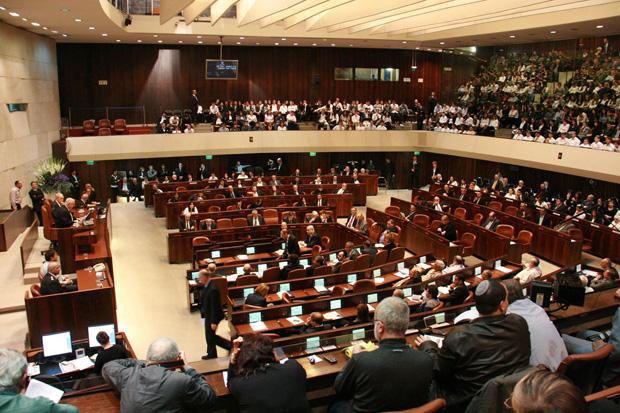Israel’s Also-Ran Parties
Knesset session in 2010 (Photo: Israel Free Image/Wiki Commons)
Israelis are gearing up for a national election on January 22nd, and the campaign is in full swing. Thirty-four parties are competing for 120 seats in Israel’s parliament, the Knesset. Voters pick parties, instead of candidates; the more votes a party gets, the more seats it wins in the Knesset.
As with Israeli elections past, this month’s contest includes a number of political parties on the fringe. Many of them won’t win any seats.
A new party, Eretz Hadasha, is a bit different, though. Its message is straightforward. It wants to expose big money in politics. The party’s logo in Hebrew is an allusion to some vulgar slang, and its Facebook page has pictures of people raising their middle fingers.
But for all the irreverence, the polls suggest Eretz Hadasha might actually win a couple of seats in parliament. In fact, it’s one of several smaller parties that are right on that edge. They have a shot of passing the two percent threshold and gaining access to legislative power in Israel.
“They are the kind of parties that come from outside of the system,” says Israeli writer Etgar Keret. He adds that there is something satisfying about voting for a party that may very well fail to get into parliament – it’s a protest vote, but it might still matter.
“Basically, they say to people, if you’ve been frustrated, but you think that voting is important and you don’t want to just to stay home, vote for something new. In Israel we have a tradition of such parties and some of them became surprisingly strong.”
Take the Pensioners Party, for example. In 2006, it surprised everyone by winning seven seats. It went on to join Israel’s governing coalition. But the Pensioners flamed out pretty quickly. That’s one downside of such a freewheeling political system.
Then there’s the Kadima Party. It was created in 2005 by one of Israel’s most iconic leaders, Ariel Sharon. In 2009, Kadima grabbed more seats than any other single party. But at this point, the polls say it’s in serious trouble.
Matti Friedman, who covers the elections for The Times of Israel, says Kadima is facing a Titanic-like situation.
“Kadima is currently the largest party in Knesset, and it was in the term of the previous government, Israel’s ruling party. And in probably the greatest political collapse in Israel’s history, this party is going to be erased,” Friedman says.
“The question is now, will it get enough votes to have two seats in the Knesset. That’s the minimum. Or, will it miss the threshold and have zero seats.”
Among the others expected to win either zero or just two seats in this election are a few religions parties, and two “pirate parties” calling for more online freedom. There’s a green environmental party as well as the Green Leaf party, which advocates the legalization of marijuana. It’s never won a seat, though this will be its fifth Israeli election.
